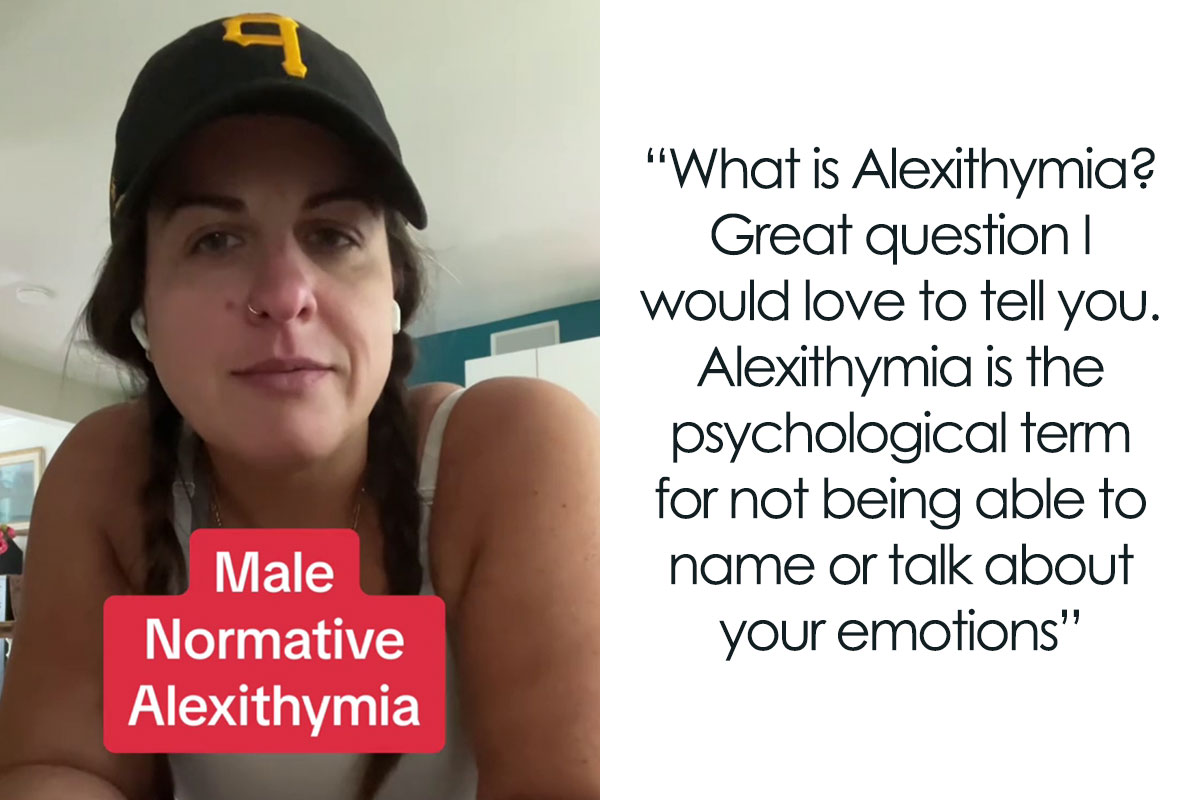
Woman Shares How Ladies Have To Carry The Emotional Burden Of Men Not Expressing Their Feelings
Interview With ExpertMen have constantly been taught to hide their emotions and not share their true feelings with anyone. And often, when they actually try and open up to their partners or loved ones, many men receive bad reactions. It’s no wonder that this has created a society of males who are struggling to process their emotions.
With such a large subset of people who can’t express their feelings, there’s bound to be counter-effects that we’d never expect. That’s exactly what a woman opened up about on TikTok. She posted a video explaining how men’s inability to deal with their emotions is ending marriages. Understandably, the comments were divided.
Bored Panda also reached out to Dr. John Barry, a chartered psychologist at the Centre for Male Psychology, to get his take on the video and to understand more about male emotions.
More info: TikTok
Katie frequently creates content about social issues; this time around, her post about marriages ending because of men not dealing with their emotions clearly struck a chord
Image credits: thekatiehanlon
“You know, sometimes we nuance the s**t out of things that are just very, very simple”
“So let me just say this. Your marriage is ending, our marriages are ending because of one thing and one thing only, that is male normative alexithymia. What is alexithymia? Great question, I would love to tell you. Alexithymia is the psychological term for not being able to name or talk about your emotions.”
Image credits: thekatiehanlon
“This doesn’t mean you don’t feel the emotion, men feel the emotion, and they just don’t know how to talk about it or how to garner empathy from each other about said emotion”
“That labor doesn’t just go away, it gets passed on to us. We deal with your emotions, your lack of ability that you have to regulate yourself. Our households live and die by your insecurities, what we’re allowed to talk about, and what we’re not allowed to talk about.”
Image credits: thekatiehanlon
“All the couples’ humor in the world does not take away from the fact that you’re just not interested in us. You’re not interested in contributing in a way that doesn’t work for you”
“And maybe your wife will never leave you. But I know for a fact there are wives all over the world who regularly cry themselves to sleep over their marriages. And what they know will never happen, which is you will never have that Westworld moment where you wake up and realize there are things you don’t know about yourself that are harming other people.”
“You have to be a f**king sociopath for that not to bother you. Not to make you change, not to make you do everything in your power, go to whatever f**king therapy, read whatever book you have to read to make that change.”
“And if you are one of the ‘good ones’, one of the good guys, and you’re not actively making this your top priority, then you are not one of the good ones. All of these conversations we’re having about division of labor, emotional labor, mental load, motherhood versus fatherhood, none of this f**king matters if we’re not addressing the problem underneath, which is the fact that men can’t deal with their emotions. They can’t label them, they can’t talk about them. And we are dying early. Thank you.”
You can watch the original video here
@thekatiehanlon Every woman longs to be loved by the men in her life. 💔#unmaskingautism #latediagnosedautistic #cptsd #audhd #misogyny #misogynykills #matriarchynow #patriarchykills #intersectionalfeminism #malenormativealexithymia #mentalloadofmotherhood #fairplay #coupleshumor #marriagehumor #genderequity #divisionofhouseholdlabor #mensemotions #fortheloveofmen #thecenterwillnothold #inyourlove #couplestherapy #parentinghumor #daddyissues #fatherwound #divinemasculine #divinefeminineenergy #matriarchyrising
According to Katie, male normative alexithymia doesn’t just affect men, it’s powerful enough to end their marriages
Image credits: Alex Green (not the actual photo)
Katie’s video had commenters torn, but it brought up an interesting point about male normative alexithymia. As Katie mentioned, alexithymia is the “psychological term for not being able to name or talk about your emotions.” Men might face this problem more, but it’s not because they can’t feel the emotion; it’s because they don’t know how to talk about it.
It is estimated that around 10% of the population have significant levels of alexithymia that can affect their lives. That being said, it isn’t a diagnosable condition or disorder. Many of us might have experienced this on a smaller scale during moments when we found it tough to share how we were feeling. But those moments often pass, and then we are able to share our emotions with clarity.
Male normative alexithymia was a term that was first used by researcher and psychologist Dr. Ronald Levant in a scientific paper about masculinity. He shared that men were “raised to be like their fathers, they were mandated to become the good provider for their families and to be strong and silent. They were discouraged from expressing vulnerable and tender emotions and required to put a sharp edge around their masculinity by avoiding anything that hinted of the feminine.” Which simply means that men were bombarded with the idea since childhood that in order to be masculine, they must hide their feelings and stay strong.
With so much practice hiding how they feel, it’s no wonder that men find it tough to describe their emotional states. After all, who could if they haven’t had practice doing so?
Image credits: cottonbro studio (not the actual photo)
Katie’s video primarily focused on the way women are affected and how their marriages are being ruined by males who cannot express their emotions. The flip side is that there are men who are bottling their feelings up and don’t know how to share them.
Dr. John Barry, the expert psychologist who we got to weigh in on this article, offers a different perspective, stating, “Some research suggests that men are just as good as women at recognizing their emotions, but whereas women are inclined to talk about their emotions, men are inclined to take action based on their feelings. It is often difficult to realize that men and women, in general, are genuinely different in this way because, in general, men and women are similar in most other ways. In most cases, neither of these two ways of coping with feelings is wrong or pathological.”
He also shares that, “It is important that men and women recognize and accept – even value – these differences between each other, because otherwise, it leads to all sorts of confusion. In the same way that it is unhelpful for men to characterize women as ‘too emotional’, women should realize that it is unhelpful to characterize men as ‘out of touch with their feelings’. In many cases, it will help if a husband just listens when his wife is talking about her feelings, and it will help if women accept that their husband might not want to talk about his feelings in the same way that she talks about hers.”
Katie’s video gathered 21.3k likes on TikTok and almost 1.8k comments, with many people sharing interesting examples. With these two contrasting opinions on men’s emotions, what you do think about Katie’s video? Do you think male normative alexithymia is as big of a problem as it was made out to be? Let us know in the comments.
Not all commenters agreed with the video, but many shared powerful personal experiences
This is a perfect illustration of one of the most dangerous aspects of social media - the half-educated "influencer" who claims to be expert - AND IS NOT. 'Hooey" is VERY easy to sell- and the people who buy it tend to believe it. And it messes up their lives- and YOUR life.
Sorry but she looses all credibility in the first 15 seconds or so, when she says 'our marriages are ending because of one thing and one thing only...' Sorry, but no, yours might be failing for that reason, but Dave an Linda broke up because because she screwed another bloke. My Aunt's marriage ended because he beat the s**t out of her. And Joanne is filing for divorce because she couldn't change him into someone that he isn't. While there is an ongoing debate surrounding the difficulties in men expressing their feelings and what happens when they do, to lump the entire blame onto 'men can't express themselves, therefore all bad s**t happens as a result' is completely disingenuous. In any relationship there is always (at least) 2 parties, and clear communication between all parties is needed. And don't just expect to be able to express yourself and think you've done your part, no. If your partner is having difficulty, it's your job to help them express.
She has a better, greater point though. It is a problem. Possibly her audience is made up of other people in her situation that she's finding words for, thus the use of 'our'. Don't get so stuck on someone not having debate class level specificity in their word choices, especially when this was clearly filmed casually.
Load More Replies...This is absolutely b******t of someone once again making themselves the victim for clout by making the "other gender" the enemy. Women are certainly NOT victims of men being socially pressured to bottle up their feelings, this is not a competition. Both the men who have to bottle up their feelings and the women are victims of the system. Why the everliving hell do people like it so much more to just randomly attack someone than bounding together against the true enemy??
Why do you read "someone has this problem and it's effecting their realationships" as blaming them?
Load More Replies...This is a perfect illustration of one of the most dangerous aspects of social media - the half-educated "influencer" who claims to be expert - AND IS NOT. 'Hooey" is VERY easy to sell- and the people who buy it tend to believe it. And it messes up their lives- and YOUR life.
Sorry but she looses all credibility in the first 15 seconds or so, when she says 'our marriages are ending because of one thing and one thing only...' Sorry, but no, yours might be failing for that reason, but Dave an Linda broke up because because she screwed another bloke. My Aunt's marriage ended because he beat the s**t out of her. And Joanne is filing for divorce because she couldn't change him into someone that he isn't. While there is an ongoing debate surrounding the difficulties in men expressing their feelings and what happens when they do, to lump the entire blame onto 'men can't express themselves, therefore all bad s**t happens as a result' is completely disingenuous. In any relationship there is always (at least) 2 parties, and clear communication between all parties is needed. And don't just expect to be able to express yourself and think you've done your part, no. If your partner is having difficulty, it's your job to help them express.
She has a better, greater point though. It is a problem. Possibly her audience is made up of other people in her situation that she's finding words for, thus the use of 'our'. Don't get so stuck on someone not having debate class level specificity in their word choices, especially when this was clearly filmed casually.
Load More Replies...This is absolutely b******t of someone once again making themselves the victim for clout by making the "other gender" the enemy. Women are certainly NOT victims of men being socially pressured to bottle up their feelings, this is not a competition. Both the men who have to bottle up their feelings and the women are victims of the system. Why the everliving hell do people like it so much more to just randomly attack someone than bounding together against the true enemy??
Why do you read "someone has this problem and it's effecting their realationships" as blaming them?
Load More Replies...
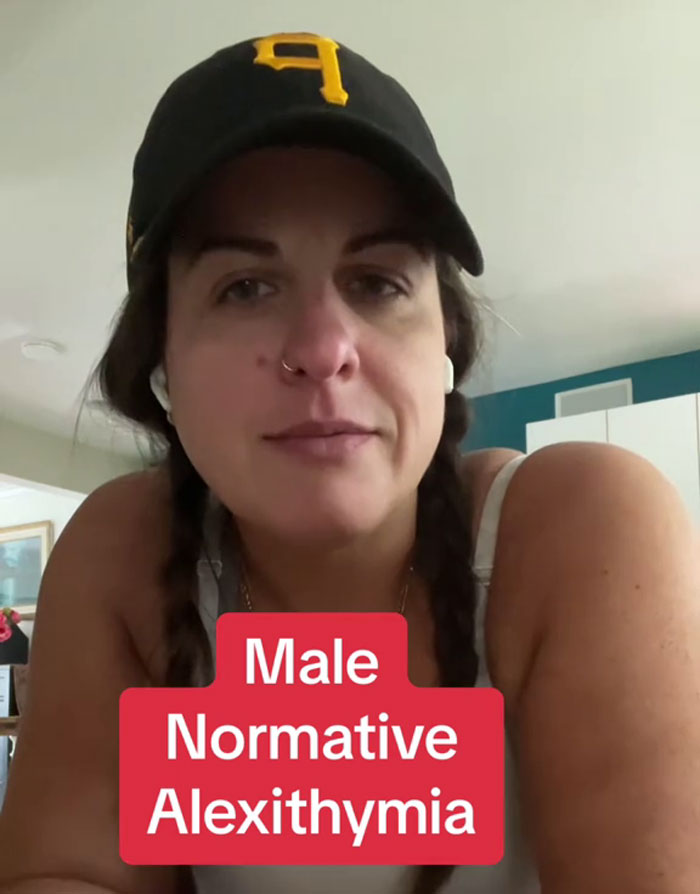
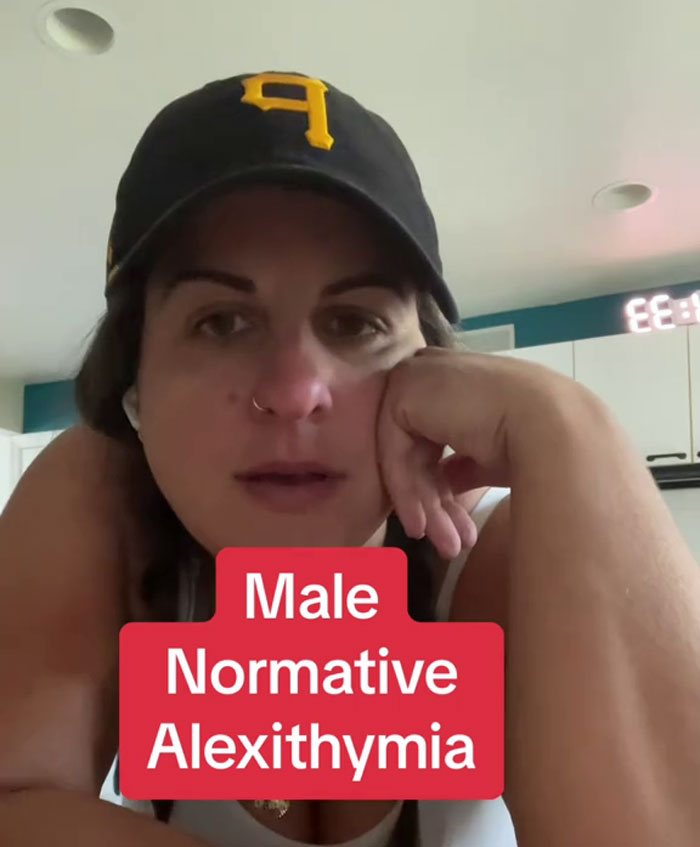
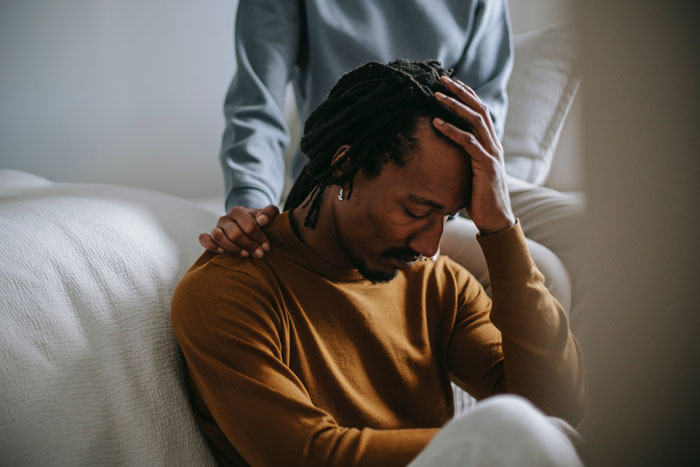

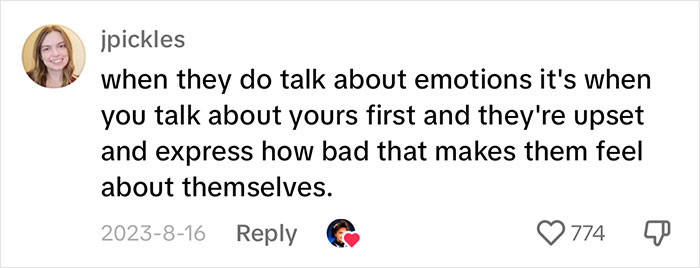
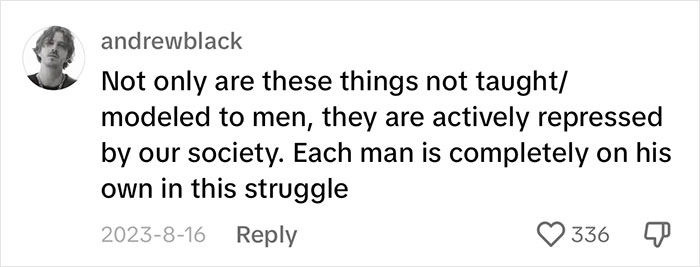

















-6
25